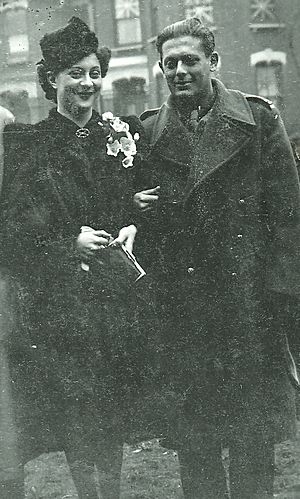Stephan Körner facts for kids
Quick facts for kids
Stephan Körner
|
|
|---|---|
 |
|
| Born | 26 September 1913 |
| Died | 17 August 2000 |
| Education | Charles University, Prague, Trinity Hall, Cambridge |
| Occupation | Philosopher |
| Employer | University of Bristol 1952–1979, Yale University 1970–1984. |
| Spouse(s) | Edith Laner m. 1944 |
| Children | Thomas Körner, Ann M. Körner |
Stephan Körner (born September 26, 1913 – died August 17, 2000) was a British philosopher. He was known for his work on Immanuel Kant, the study of concepts, and the philosophy of mathematics.
Stephan Körner was born into a Jewish family in what is now Czechoslovakia. In 1939, after the German army took over, he left his home to escape danger. He came to the United Kingdom as a refugee. There, he began studying philosophy.
By 1952, he became a professor of philosophy at the University of Bristol. Later, in 1970, he also became a professor at Yale University. He was married to Edith Körner. They had two children: Thomas Körner, who became a mathematician, and Ann M. Körner, a biochemist, writer, and translator.
Contents
Stephan Körner's Early Life
Stephan Körner was born in Ostrava on September 26, 1913. At that time, Ostrava was part of Austria-Hungary. He was the only son of a teacher.
His father wanted him to study something practical. So, Stephan studied law at Charles University in Prague. He finished his degree in 1935. He was interested in law and even attended seminars at Yale Law School later in life. From 1936 to 1939, he served as an officer in the cavalry for his country's military.
Escaping Danger and War Service
In March 1939, German troops moved into Czechoslovakia. A former schoolmate, who was an officer in the SS, warned Stephan's family. He told them that life for Jewish people in German-occupied Moravia was no longer safe.
His parents did not leave. Sadly, his father passed away in 1939 during a forced relocation. His mother passed away in 1941 after being sent to the Minsk Ghetto. Many other family members, including his cousin Ruth Maier, also died during the Holocaust.
Stephan traveled with two friends through Poland to the United Kingdom. He arrived as a refugee just as World War II began. In Britain, he joined the army of the Czechoslovak government in exile. He fought with them during the Battle of France in 1940 before returning to Britain.
Studying Philosophy in Cambridge
He received a small grant to continue his education at the University of Cambridge. He studied philosophy at Trinity Hall. One of his teachers was the famous philosopher Ludwig Wittgenstein.
His professor, R. B. Braithwaite, was very kind to him. Stephan had little money and worked as a waiter. He often ate only "one fourpenny meat pie per day."
In 1943, he was called back to the Czechoslovak army. He served as a sergeant in the infantry during the push through France and into Germany. He later said that a book by Charles Dickens saved his life. While recovering from a small wound, a doctor made him stay an extra day to finish his novel. Because of this, he missed heavy fighting the next day where many friends were killed.
He earned his PhD in 1944. Soon after, he married Edith Laner. She was also a Czech refugee whom he had met in London in 1941. He stayed in the Czechoslovak army until 1946.
Stephan Körner's Academic Career
After his army service, Stephan Körner worked at Cardiff University. He started his first academic job in 1947. He became a philosophy lecturer at the University of Bristol. In 1952, he became a full professor and head of his department. He held this position until 1979.
He also served as Dean of the Faculty of Arts from 1965 to 1966. From 1968 to 1971, he was a Pro-Vice-Chancellor.
Visiting Professorships and Honors
During his time at Bristol, he was a visiting professor at several universities in the United States. These included Brown University (1957), Yale University (1960), and the University of North Carolina at Chapel Hill (1963). He also taught at the University of Texas at Austin (1964) and Indiana University (1967).
In 1970, he returned to Yale University. He became a tenured visiting professor there. He held this job along with his Bristol position for nine years. From 1979 to 1984, it was his only job. When he retired from Bristol, they made him a professor emeritus. He also held a visiting professorship at the University of Graz in Austria from 1980 to 1989.
He received special honorary doctorates from Queen's University Belfast in 1981 and Graz in 1984. In 1986, Graz made him an honorary professor. Bristol gave him an honorary fellowship in 1987, and Trinity Hall did the same in 1991.
Leadership in Philosophy
Stephan Körner was a leader in many philosophical societies. He was President of the British Society for the Philosophy of Science in 1965. He also led the Aristotelian Society in 1967 and the Mind Association in 1973.
He edited the philosophy journal Ratio from 1961 to 1980. He was also on the editorial board of Erkenntnis from 1974 to 1999. In 1967, he was elected a Fellow of the British Academy.
Stephan Körner's Philosophical Ideas
In 1955, Stephan Körner published his first two major books. One was Kant, an introduction to Immanuel Kant's work. This book helped bring Kant's ideas back to English-speaking readers after the war.
His second book, Conceptual Thinking, looked at how people use "exact" and "inexact" concepts. Exact concepts, like math ideas, are clearly defined. Inexact concepts, like 'color', have unclear boundaries. In 1957, he edited Observation and Interpretation. This book brought together philosophers and physicists to discuss these ideas.
Philosophy of Mathematics and Science
His work led him to the philosophy of mathematics. He published a textbook on this topic in 1960 called Philosophy of Mathematics. It explored how applied mathematics can be possible in the real world.
He also wrote about the philosophy of science in Experience and Theory (1966). This included ideas about theoretical incommensurability. This is the idea that two different theories, like classical mechanics and relativity, can both exist without one being completely "wrong."
In 1969, he published What is Philosophy?. In 1970, he wrote Categorial Frameworks. These books tried to explain his ideas to a wider audience. His book Experience and Conduct (1979) discussed how we choose our preferences and values. His last major work, Metaphysics: Its Structure and Function (1984), was a broad study of metaphysics.
Stephan Körner's Personal Life
Colleagues remembered Stephan Körner as a very charming person. He had a formal but polite way of acting. He always wore a tie and jacket, even on hot days.
He had a happy home life with his wife, Edith. Friends remembered them as being very close. In their early marriage, Edith managed the household and finances. This allowed Stephan to focus on his studies.
Later, after their children grew up, Edith started her own career. She became the chairman of the magistrates' court in Bristol. She also helped improve the National Health Service's information system. Stephan often said, "Diti does everything, but leaves the philosophy to me."
The couple had two children. Their son, Thomas Körner, became a professor of mathematics. Their daughter, Ann, became a biochemist, writer, and translator. Ann married Sidney Altman, who won the Nobel Prize in Chemistry in 1989.
Stephan and Edith passed away in August 2000. They were survived by their two children and four grandchildren.
See also
 In Spanish: Stephan Körner para niños
In Spanish: Stephan Körner para niños
 | Jessica Watkins |
 | Robert Henry Lawrence Jr. |
 | Mae Jemison |
 | Sian Proctor |
 | Guion Bluford |


